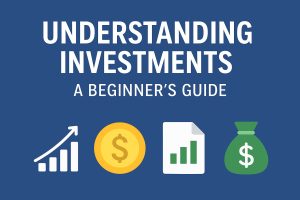Introduction: Why Everyone Should Learn About Investments
Money sitting idle in your savings account slowly loses value due to inflation. Imagine keeping ₹1,000 or $100 in your savings account for 10 years—it might still be ₹1,000 or $100, but what you can buy with it will be much less.
That’s where investments come in. By investing, you make your money work for you. Investments help you:
- Grow your wealth over time.
- Beat inflation and preserve purchasing power.
- Achieve financial independence faster.
But for beginners, terms like stocks, bonds, mutual funds, SIPs, ETFs, diversification, etc., can be confusing. This guide will break it all down in simple words.
What Exactly Are Investments?
An investment is when you put your money into an asset with the expectation of generating a return in the future.
Example:
- Putting ₹10,000 in a fixed deposit (FD) gives you ~6–7% interest per year.
- Buying ₹10,000 worth of stocks may give you 15% in a good year—or a loss if the stock falls.
The key difference from savings is risk: investments involve the possibility of loss, but also the potential for higher returns.
Why Should You Invest?
- To Beat Inflation
If inflation is 6% and your savings account gives you only 3%, your money is actually losing value every year. Investments like mutual funds, stocks, or bonds can help bridge this gap. - To Achieve Life Goals
Buying a home, funding your child’s education, traveling, or retiring comfortably—all require money. Investing systematically helps you reach these milestones. - To Build Wealth & Security
Smart investing ensures you don’t just work for money—your money works for you. - For Passive Income
Investments like dividends, bonds, or rental income can create a secondary income stream.
Types of Investments (Beginner-Friendly Overview)
1. Stocks (Equity)
- Ownership in a company.
- High return potential, but high volatility.
- Example: Buying shares of TCS, Apple, or Tesla.
2. Bonds (Debt Instruments)
- You lend money to governments or companies.
- Safer than stocks, but returns are fixed and lower.
- Example: Indian Government Bonds, US Treasury Bonds.
3. Mutual Funds & ETFs
- Pool of money collected from many investors.
- Managed by professionals.
- Safer for beginners since your money is spread across many stocks.
- Example: Index funds like Nifty 50, S&P 500 ETFs.
4. Real Estate
- Buying property for appreciation or rental income.
- High capital requirement and less liquid.
5. Gold & Commodities
- Hedge against inflation and uncertainty.
- Can be bought as physical gold, digital gold, or ETFs.
6. Retirement Accounts & Pension Schemes
- Long-term investments designed for retirement.
- Example: PPF, NPS (India), 401(k), IRA (US).
7. New-Age Investments (Crypto, Startups, REITs)
- Cryptocurrencies, startups, and REITs offer high risk, high reward.
- Not recommended for complete beginners.
Risk vs. Return: The Most Important Lesson
Every investment carries a trade-off:
- Low Risk = Low Return (FDs, savings, bonds).
- Medium Risk = Medium Return (mutual funds, ETFs).
- High Risk = High Return (stocks, crypto, startups).
Example:
- Fixed Deposit: 6% safe return.
- Mutual Funds: 10–12% average over long term.
- Stocks: 15–20% if chosen wisely, but risk of losses.
The trick is to diversify—don’t put all your money in one type of investment.
How to Start Investing as a Beginner
- Set Your Goals
Are you investing for retirement, buying a house, or just wealth creation? Your goal decides your investment type. - Understand Your Risk Appetite
- Conservative → Bonds, FDs, balanced mutual funds.
- Moderate → Mutual funds, index funds.
- Aggressive → Stocks, startups, crypto.
- Build an Emergency Fund First
Keep at least 3–6 months of expenses in savings before investing. - Start Small
Don’t wait to have lakhs/dollars. Even ₹1,000 ($20) monthly SIP is a start. - Automate Investments
Use SIPs (Systematic Investment Plans) for mutual funds. It builds discipline. - Stay Consistent & Long-Term
Wealth grows with patience. Time in the market > Timing the market.
Common Beginner Mistakes to Avoid
- Chasing quick profits or “hot stock tips.”
- Putting all money in one asset class.
- Investing without understanding risk.
- Withdrawing investments too soon.
- Ignoring financial education.
Real-Life Example: Two Friends, Two Paths
- Ravi keeps ₹5,000/month in savings account at 3%. After 10 years, he has ~₹6.8 lakh.
- Anita invests ₹5,000/month in a mutual fund at 10%. After 10 years, she has ~₹10.3 lakh.
Same money, different outcomes—because Anita invested.
FAQs on Investments
1. Is investing risky?
Yes, but risk can be managed with diversification and long-term discipline.
2. How much should I invest?
Start with at least 20–30% of your monthly income after expenses.
3. Can beginners invest without experience?
Yes—start with mutual funds, index funds, or robo-advisors.
4. What if I don’t have much money?
Start small. Even ₹500–₹1,000 SIPs in India or $20–$50 ETFs in the US make a big difference over time.
Expert Take
Financial planners recommend a “core-satellite” approach for beginners:
- Core → 70–80% in safe, diversified funds (index funds, ETFs).
- Satellite → 20–30% in higher-risk assets (stocks, crypto, startups).
This balance gives stability while still allowing growth.
Actionable Advice
- Open a demat + mutual fund account.
- Start with index funds or diversified mutual funds.
- Review your investments every 6–12 months.
- Keep learning through books, blogs, and financial news.
Final Thoughts
Investing is not rocket science—it’s a habit. The earlier you start, the more time your money has to grow. Whether you are a student, young professional, or nearing retirement, there is always an investment option for you.
Remember: Start small, stay consistent, and think long-term. Your future self will thank you.



